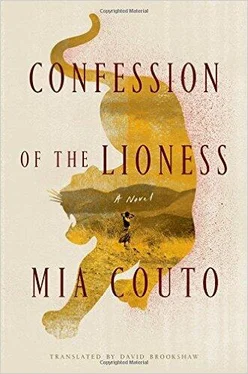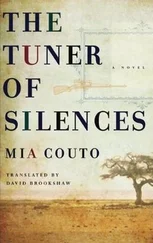* * *
Naftalinda Makwala visits us at the end of the day to warn us that something is being prepared in the village. We should be watchful, and we shouldn’t leave the house or expose ourselves. We should keep an eye open without being seen.
If you go out, you risk death!
What’s happening? the writer asks anxiously, lifting the corner of the curtain in the window.
Senhor Gustavo? Come away from there! You mustn’t look!
The First Lady calls me over to a corner and places herself in front of me, pressing her generous buttocks against my body. From that window, we could look out over the square in front of us.
The men are arriving. Stand here, right by me , she says.
The ritual that precedes a collective hunt, the kuyola liu , is about to begin. The square is getting ready to receive the two dozen men who will set out on the hunt for lions in the early hours of the morning. How I wished I could be there to take part in the ritual! Naftalinda understands my disappointment:
You are like me, a woman: We’re excluded. Let’s keep each other company. Isn’t it nice here, in this little patch of shadow?
Shadow? The inside of the house is shrouded in darkness. Outside, the last vestiges of the day are being extinguished. The ritual has been summoned as an emergency. The heads of families, the sons of the soil, want to be the ones to chase away the threat that hangs over the village. They don’t want to concede to me, a stranger, the honor of conducting this battle against such powerful, invisible forces.
The menfolk of Kulumani have come together, along with a few others from neighboring villages. Each one is carrying a bow, a shotgun, a cutlass, or a net. They’ve brought with them food and water, carried in bottles and haversacks. They gather in the open space around the shitala and there doesn’t seem to be any set agenda for the event, no hierarchy among them. They shoo away the dogs that are beginning to get excited with all the activity. A young boy tries to join the group, but is quickly turned away. He hasn’t undergone the rituals of initiation. Gradually, as if in response to some hidden master of ceremonies, chants begin to be heard, and the first timid dance steps are tried. Naftalinda can’t resist joining in and her buttocks begin to sway, pressing ever more tightly against me. My head spins and I’m almost thrown off balance. What if the administrator were to catch me in this sultry dance with his wife? Suddenly one of the dancers exclaims:
Tuke kulumba!
It’s the call for action. Then, as if carried forward by some invisible wave, the men stamp their feet rhythmically on the ground, and a cloud of dust envelops their bodies.
Now they’ve kicked up the dust! the First Lady whispers, her face next to mine.
Now , she says, all I feel is anger, I can’t watch any more of this. And she retreats to the back of the house, joining Hanifa, who is preparing a meal.
* * *
Suddenly Makwala the administrator crosses the square. He is accompanied by the policeman. He shouts as he stirs up the dust:
What’s going on here? Is this a demonstration? Did you get the necessary authorization?
I take advantage of the First Lady’s absence and furtively escape from the house, disobeying the strict instructions to keep myself hidden and shut away. The writer follows me, his camera slung over his shoulder. We join Florindo Makwala in the middle of the square. The villagers stop their ceremony and observe us silently, full of hostility. It’s clear by the way they look at us: We are intruders, we are desecrating the occasion. The writer immediately realizes that taking photographs is out of the question. And one word in Shimakonde is enough to bring the administrator to heel, rendering him unable to ask any further questions.
One of the hunters leaves the group and comes over to me to take a bullet from the cartridge belt that I wear across my chest. He examines the projectile, turning it over in his fingers. Then he asks:
Do you know who made it?
Who made the bullet?
Yes.
It’s impossible to know …
The man smiles arrogantly. Then he raises his spear to the level of his face and, looking straight into my eyes, proclaims:
I know who made my weapon.
Then he dances away from us in a series of acrobatic pirouettes, at each turn touching the ground with the tips of his fingers. He picks up a stone the size of a fist and raises it above his head, this time laying down a challenge to the administrator Makwala. He addresses him in Shimakonde, while the policeman translates for me:
You can sell all of this, the sky, the earth, the waters. You can sell us. But the spirits don’t talk to money.
After a few more leaps, the hunter continues his speech:
Of all the stones in the world, there is one that is not of this earth. That is the flying stone.
With all his strength, he hurls the stone into the air with such impetus that it disappears from sight over the canopy of the trees. Everyone knows that the stone will never fall to earth. Turned into a bird, the stone will guide the villagers in their search for their prey. After a pause, the dancing starts again. The policeman warns us:
I don’t know whether it’s worth our staying here …
The men start taking off their clothes. Then they douse their naked bodies with an infusion made from the barks of trees. This mixture will make them immune to any disaster.
I take a look at the rear of the house. Hanifa, her back turned, is busy putting out the kitchen fire. No fire can be lit while this ritual bathing is occurring. Only after the men have finished their washing can Hanifa and all the other women light their fires once again.
The men dance for a little longer, and while they are gyrating and jumping they begin to lose their inhibitions, and soon they are screaming, growling, and soiling their chins with froth and spittle. It’s then that I understand: Those hunters are no longer humans. They are lions. Those men are the very animals they seek to hunt. What’s happening in the square merely confirms this: Hunting is witchcraft, the last piece of witchcraft to be permitted by law.
Finally, the men leave in silence, and like this, marching in military formation without saying a word, they will search the bush for days on end, without food, drink, or shelter. A strange peace descends upon Kulumani. One by one, the cooking fires are lit again in the huts.
* * *
The writer comments ecstatically:
What an unforgettable sight! A performance rooted in Nature. What a pity I couldn’t take photographs of it!
Did you like it? Naftalinda asks. She wears an enigmatic, almost defeated smile. But then she asks: How many men were there in the ceremony?
About twenty, maybe.
There were twelve in the other group.
The other group? What group?
The ones that killed Tandi, my maid. There were twelve of them. Some of them were dancing here right in front of you.
They killed her?
They killed her spirit, only her body was left. A wounded body, the ruins of a person.
She recounts what had happened: Her maid had inadvertently crossed the mvera , the camp accommodating the boys undergoing their initiation. The place is sacred and women are expressly forbidden to enter the area. Tandi disobeyed and was punished: She was raped by all the men. All of them took their turn with her. The girl was taken to the local health center, but the nurse refused to treat her. He was afraid of retaliation. The district authorities received a complaint, but didn’t do anything. Who has the courage in Kulumani to rise up against tradition?
Читать дальше












